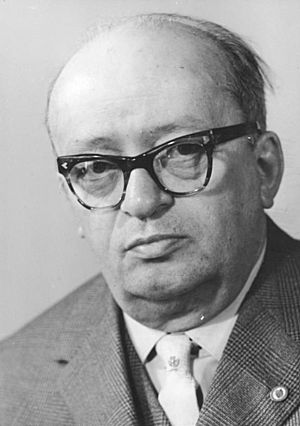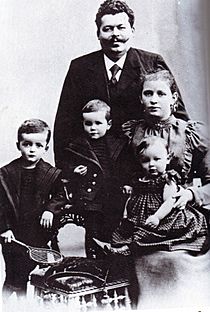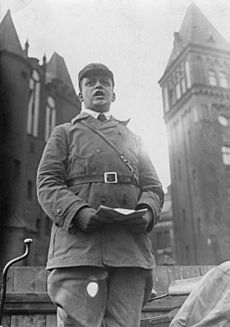Friedrich Ebert Jr. facts for kids
Quick facts for kids
Friedrich Ebert Jr.
|
|
|---|---|

Ebert in 1961
|
|
| 1st Lord Mayor of East Berlin | |
| In office 30 November 1948 – 5 July 1967 |
|
| Preceded by | Office established |
| Succeeded by | Herbert Fechner |
| Personal details | |
| Born | 12 September 1894 Bremen, German Empire |
| Died | 4 December 1979 (aged 85) East Berlin, East Germany |
| Citizenship | East German |
| Political party | SED |
| Parents |
|
| Occupation | Printer, journalist |
Friedrich "Fritz" Ebert Jr. (born September 12, 1894 – died December 4, 1979) was an important German politician. He was the son of Germany's first president, Friedrich Ebert.
Like his father, Fritz first joined the Social Democratic Party. But he is most known for helping to create the Socialist Unity Party of Germany. This party was very important in setting up East Germany (also called the German Democratic Republic), where he held many different jobs.
Contents
Early Life and Challenges
Fritz Ebert Jr. was born in Bremen, Germany. From 1909 to 1913, he learned to be a printer. In 1910, he joined a youth group called the Socialist Workers' Youth. Later, in 1913, he joined the SPD.
From 1915 to 1918, he served as a soldier in the First World War. After the war, during a time known as the Weimar Republic, he worked for newspapers that supported the Social Democratic Party.
In 1933, Ebert was arrested because of his political activities. He was held for eight months in different camps, including Oranienburg. In 1939, he was called into the army again. Until 1945, the police watched him closely.
Becoming a Leader in East Germany
After World War II ended, Fritz Ebert Jr. became a key political figure in East Germany. Because he was the son of a former president, he was very well-known. Leaders of the Communist Party of Germany wanted to join forces with the larger Social Democratic Party. They hoped Ebert would support this idea because of his father's important role in German history.
In 1946, the two parties in the Soviet-controlled part of Germany merged. This happened because of pressure from the Soviet Union. The new party was called the Socialist Unity Party of Germany (SED). Ebert was chosen to be part of its main leadership group, called the Central Committee. From 1949, he was also a member of the Politburo, an even smaller, more powerful group.
From 1946 to 1949, he was the President of the state parliament (Landtag) in Brandenburg.
Important Roles in East Germany
After Berlin was divided, Ebert became the mayor of East Berlin. He served as mayor for many years, until 1967.
He was also a member of the Deutscher Volksrat, which was a group that helped write the first constitution for East Germany. After 1949, he became a member of the People's Chamber, which was East Germany's parliament.
From 1949 to 1971, Ebert was the deputy president of the People's Chamber. In 1971, he became the leader of the SED group within the People's Chamber.
Starting in 1960, he was also a member of the Council of State. This group was like the country's presidency. In 1971, he became its deputy chairman. When Walter Ulbricht, the head of state, died in 1973, Ebert briefly served as acting head of state until a new leader was chosen.
Fritz Ebert Jr. received several important awards for his work, including the Order of Karl Marx and the Patriotic Order of Merit. After he stepped down as mayor, East Berlin made him an honorary citizen.
Images for kids
See also
 In Spanish: Friedrich Ebert (hijo) para niños
In Spanish: Friedrich Ebert (hijo) para niños
 | Delilah Pierce |
 | Gordon Parks |
 | Augusta Savage |
 | Charles Ethan Porter |






